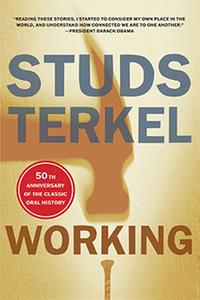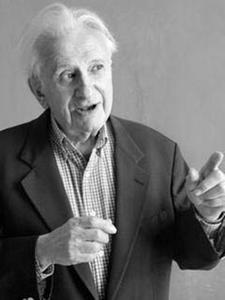I know Labor Day has come and gone, but I just wanted to revisit it briefly to note that one of the ways I celebrate the long weekend annually is to reread Studs Terkel, a writer who invokes the true spirit of the holiday for me in a Dickens/Christmas way.
 Earlier this year, the New Press declared 2024 the Year of Studs to mark the 50th anniversary of Working: People Talk About What They Do All Day and How They Feel About What They Do, as well as the 40th anniversary of his Pulitzer Prize-winning book, The Good War. "This is not just a chance to re-visit his seminal work, which still speaks to readers today," the publisher noted at the time. "Whether its President Obama’s Netflix limited series Working: What We Do All Day or Mark Larson's recently published Working in the 21st Century (Agate), Terkel's investigation into what we do daily continues to inspire. Not a week goes by without performances of the musical adaptation of Working in theaters and high schools across the country. With this celebration comes an opportunity to introduce Terkel to a new generation. We hope you will join us because everything is coming up Studs! Red socks and red checked shirts are optional but strongly encouraged."
Earlier this year, the New Press declared 2024 the Year of Studs to mark the 50th anniversary of Working: People Talk About What They Do All Day and How They Feel About What They Do, as well as the 40th anniversary of his Pulitzer Prize-winning book, The Good War. "This is not just a chance to re-visit his seminal work, which still speaks to readers today," the publisher noted at the time. "Whether its President Obama’s Netflix limited series Working: What We Do All Day or Mark Larson's recently published Working in the 21st Century (Agate), Terkel's investigation into what we do daily continues to inspire. Not a week goes by without performances of the musical adaptation of Working in theaters and high schools across the country. With this celebration comes an opportunity to introduce Terkel to a new generation. We hope you will join us because everything is coming up Studs! Red socks and red checked shirts are optional but strongly encouraged."
North Figueroa Bookshop, Los Angeles, Calif., got on board by asking @natpainted to create a mural celebrating Working's anniversary.
Labor Day. Studs Terkel. The work. What do you do?
That's still the question people most often ask when they meet you. Since 1992, this has been an easy one for me to answer. I was a bookseller until 2006, and for the past 18 years I've been an editor and columnist. Tracking back to other jobs I've had in the past, the answers have included marble mill worker, grocery store clerk, prep cook, specialty food route sales rep. Always and everywhere, however, I've thought of myself primarily as being defined by a single quality: a good worker.
 |
|
| Studs Terkel (photo: Nina Subin) |
|
Did anybody get working people better than Studs did? You might have your own alternatives, but I've been reading and rereading him since the mid-1970s, when I first picked up a copy of a new book titled Working. It hit me in the gut from page one, and has been a bookish companion during my own working life. No matter what kind of good or crap job I had, his writing, along with the brilliant growl I heard on radio and TV, always spoke to me, had my back, poked me in the ribs sometimes, reminding me to take the world very seriously but myself less so.
I actually met Studs in 2004, during BookExpo America in Chicago... at Bill Ayers's house. Maybe I should explain. That year I was invited to one of those publisher-sponsored dinners that were the social staple of book shows. This one happened to be at the Hyde Park home of Bernardine Dohrn and Bill Ayers, names deeply tied to Chicago and activism. I'd first met Bill in 2001 while we were at Bennington College--in our energetic dotage--working toward MFA in Writing degrees. For two people who couldn’t have lived more different lives when we were young, our connection happened quite naturally, an outgrowth, perhaps, of something Bill had once suggested in a New York Times Op-ed piece, when he wrote that "talking and listening to the widest range of people is not a sin, but a virtue."
Which, of course, comes right out of the Studs Terkel playbook. But let's get back to our story. On that night in 2004, in Bill's crowded living room, Studs held court from the sofa, looking at once frail and indomitable. He was 92, and would be gone just four years later, but this simple gem of a moment is my cherished memory of the man at work and at play.
When I was a bookseller, I loved handselling, of course, but also took pleasure in the awareness of my fingers dancing instinctively across a cash register and, later, a keyboard, ringing up purchases during a big rush. I'd started working as a clerk at an A&P store when I was in high school, and later spent another decade in the grocery business.
Long before my career as a bookseller--putting in my time at POS stations--I was an accomplished cashier. Even at 17, customers lined up at my register because I was fast and proud of it. Maybe that's why one of my favorite chapters in Working is about Babe Secoli, the supermarket checker who says, "It's hard work, but I like it. This is my life.... I'm just movin'--the hips, the hand, and the register, the hips, the hand, and the register.... You just keep goin', one, two, one, two. If you've got that rhythm, you're a fast checker. Your feet are flat on the floor and you're turning your head back and forth.... If somebody interrupts to ask me the price, I'll answer while I'm movin'. Like playin' a piano."
What do you do? For the past three decades I've worked with books, so I appreciate the words of bookbinder Donna Murray, who told Studs in Working: "Books are the thing that keep us going.... Because a book is a life, like one man is a life. Yes, yes, this work is good for me, therapeutic for old age... just keep going with the hands." Happy belated Labor Day.

